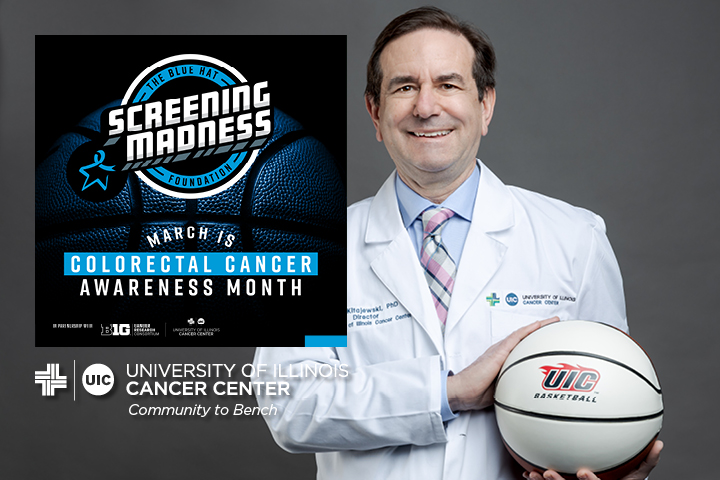March 3, 2021:
Big Ten basketball teams battle it out on the hardwood each March in hopes of making it to the madness that’s the national tournament, but this year the institutions are setting aside their rivalries to team up for Screening Madness.
Colorectal Cancer Awareness Month tips off each March, and the Big Ten Cancer Research Consortium and The Blue Hat Foundation, a Chicago-based colorectal cancer organization founded by colorectal cancer survivor Candace Henley, are uniting to raise awareness of the disease with a goal of increasing screenings. Colorectal cancer starts in the colon or the rectum, and nearly always develops from precancerous polyps, or abnormal growths. Screening tests can locate precancerous polyps so they can be removed before turning into cancer, and the tests can also find colorectal cancer early, when treatments are more successful.
Pictured: Jan Kitajewski, PhD, “coach” of the University of Illinois Cancer Center, readies his team to battle other Big Ten cancer centers in the inaugural Screening Madness.
A special webpage, bigtencrc.org/ScreeningMadness, has been created on the Big Ten CRC website that contains a playbook to educate individuals on the importance of colorectal cancer screening. Individuals are urged to take the pledge to “get screened for colorectal cancer, or to encourage someone else age 45 or older to get screened.” When signing the pledge, they can designate a Big Ten team they want their pledge to count toward. A scoreboard with all of the institutions represented will be updated daily to see which team is in the lead. The institution with the most screenings at the end of March will be declared the winner.
An avid sports fan, Henley watched events throughout the years highlighting breast cancer, but she found colorectal cancer awareness lacking. Since Colorectal Cancer Awareness Month coincides with the National Collegiate Athletic Association’s (NCAA) annual basketball tournament, she believed it was the opportunity she was seeking to disseminate information on the disease. After receiving a favorable response from administrators at the University of Illinois Cancer Center on her ideas, she approached the directors at the Big Ten CRC, who were equally enthusiastic.
“As a colorectal cancer survivor, I know it’s a serious disease, but we also wanted to make the event fun,” said Henley, who was diagnosed with the disease 17 years ago. “The competition during a Big Ten basketball game can be intense, but here the spirit of competition is friendly, because when it comes to battling colorectal cancer, we’re all on the same team.”
The website also contains links that will direct individuals to each Big Ten institution that offers screenings. Individuals are also encouraged to post photographs on their social media sites (Twitter and Facebook) wearing a piece of royal blue (the official color of Colorectal Cancer Awareness Month, as well as the Blue Hat Foundation) clothing. The photographs should contain the phrase #ShowYourBlue.
Excluding skin cancers, colorectal cancer is the third most common cancer diagnosed in both men and women in the United States. The American Cancer Society estimates that 104,270 new cases of colon cancer will be diagnosed in 2021, and 45,230 new cases of rectal cancer. The rate of people being diagnosed with colon or rectal cancer each year has dropped overall since the mid-1980s, mainly because more people are getting screened and changing their lifestyle risk factors, such as exercising more and eating a healthier diet, the ACS said.
The Big Ten CRC website also contains a playbook with 15 important facts about colorectal cancer, providing statistics on prevalence of the disease in the Black community, as well as signs and symptoms of the disease, among other information.
For more information on The Blue Hat Foundation, visit www.thebluehatfoundation.org.
Story adapted with permission by the University of Illinois Cancer Center. See original post.
About the Big Ten Cancer Research Consortium: The Big Ten Cancer Research Consortium was created in 2013 to transform the conduct of cancer research through collaborative, hypothesis-driven, highly translational oncology trials that leverage the scientific and clinical expertise of Big Ten universities. The goal of the Big Ten Cancer Research Consortium is to create a unique team-research culture to drive science rapidly from ideas to new approaches to cancer treatment. Within this innovative environment, today’s research leaders collaborate with and mentor the research leaders of tomorrow with the unified goal of improving the lives of all patients with cancer.
About the Big Ten Conference: The Big Ten Conference is an association of world-class universities whose member institutions share a common mission of research, graduate, professional and undergraduate teaching and public service. Founded in 1896, the Big Ten has sustained a comprehensive set of shared practices and policies that enforce the priority of academics in the lives of students competing in intercollegiate athletics and emphasize the values of integrity, fairness and competitiveness. The broad-based programs of the 14 Big Ten institutions will provide over $200 million in direct financial support to more than 9,800 students for more than 11,000 participation opportunities on 350 teams in 42 different sports. The Big Ten sponsors 28 official conference sports, 14 for men and 14 for women, including the addition of men’s ice hockey and men’s and women’s lacrosse since 2013. For more information, visit www.bigten.org.

















Subscribe to the Big Ten CRC Newsletter X
X Facebook
Facebook YouTube
YouTube